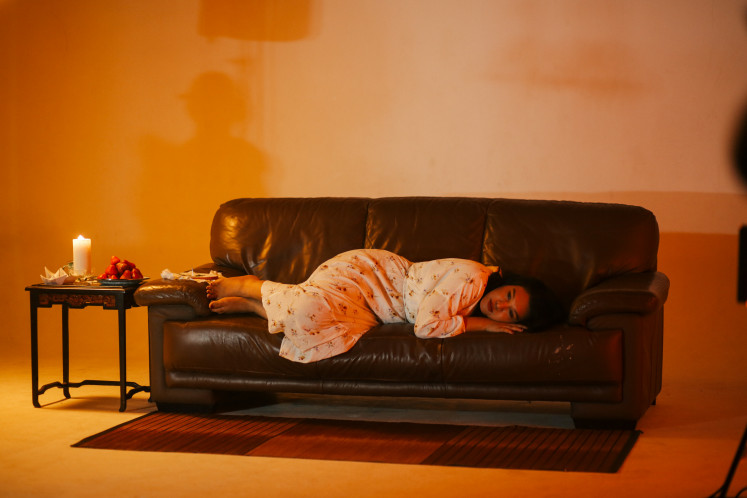Popular Reads
Top Results
Can't find what you're looking for?
View all search resultsPopular Reads
Top Results
Can't find what you're looking for?
View all search resultsNothing to ridicule: CERITRANS celebrates trans women’s voices
CERITRANS, a project that encourages trans women to share their experiences through art.
Change text size
Gift Premium Articles
to Anyone
“As a ‘boy’ whom everyone saw as girly, I was often subject to ridicule by other students, teachers and even people I’d pass on the street. They would call me a banci. Some of them would whisper to each other and laugh whenever they saw me walk by. Some would yell something at me, then run away, snickering. Some would pelt me with rocks, sticks, or old drink containers and food wrappers.”
Kanzha Vinaa’s voice is steady and firm as she shares this dreadful episode of her youth – one of many – but the pain and hurt in her eyes is real. Sitting on a sofa, beside her a small table with a burning candle on it, she speaks about her journey as a trans woman.
Kanzha is one of 10 trans women who participated in “CERITRANS – Trans Stories Transcending Borders,” a collaborative arts project that brought together trans women from Greater Jakarta and gave them a platform to share their stories through prose, poetry and filmed performances.
CERITRANS was produced by the House of the Unsilenced series of InterSastra, an independent initiative for literary and artistic exploration with the aim to achieve a creative and inclusive society. The project was realized in collaboration with Eliza Vitri & Infinity, an initiative introducing a collaborative creative method based on writing workshops and guerrilla dissemination of the resulting works; Sanggar Swara, a Jakarta-based school and community of trans women; Khairani Barokka, a United Kingdom-based poet and disability justice activist; and support of the British Council.
Bitter past: Kanzha Vinaa recalls being ridiculed and abused by those who could not understand her identity. (CERITRANS/Courtesy of Rayner Wijaya)Lead artist and mentor Eliza Vitri Handanyani says CERITRANS was a passion project.
“By having trans women tell their own stories, we are subverting tropes of representation and claiming a wider space for trans women’s artistic expressions,” she explains.
The participants of CERITRANS regularly came together from March to May this year, taking part in prose and poetry writing workshops to tell their stories in written form. Afterward, their stories were edited, translated, illustrated, and adapted for performance, with the help of InterSastra’s extensive network. Before filming their performances, the trans women participated in several rehearsals to hone their skills in front of the camera.
Throughout the whole process, a psychological first aid team was on standby to assist and support the participants as they shared their traumatic memories.
For Kanzha, who is also the head of Sanggar Swara, CERITRANS was empowering, necessary and long overdue.
“Trans women’s space for creative expression is increasingly limited and under attack,” she says, adding that Arus Pelangi’s research in 2017 and 2013 showed that 92 percent of LGBTIQ individuals in Indonesia have experienced violence, and of all these cases, 35 percent were experienced by trans women.
“In the media and popular culture, transgender people’s representations and creative expressions are often repressed or taunted,” she continues. “Through this project, I hope that we can raise awareness for our cause so that other trans women won’t be treated the way we were.”
Some of the films – which serve as the visual representation of what the trans women have written – include singing, dancing and acting, others are presented in the form of a monologue or in interview format. Regardless of which approach the participants have decided to take, the films are extremely moving: from heart-wrenching and emotional to humorous. Most memories are painful, but some also include a glimmer of hope, a sense of understanding and support.
Rere Suketi, a dangdut singer, recalls how she bowed to societal pressure and agreed to get married and start a family – but soon had to realize that she couldn’t keep living a lie just to make her parents happy. She decided to come clean.
Telling their stories: Rari Rahmat, one of the CERITRANS storytellers, during the filming stage of the project. (CERITRANS/Courtesy of Rayner Wijaya)Rere writes: “I really didn’t expect my mother to be so understanding. She, who at first had wanted me to find happiness in marriage, turned out to be even more hurt to see her child facing his inner struggle alone. I never returned to my wife after that, even when she gave birth. Only my mother and father were at the delivery. After the baby was born, my mother told me, ‘Just divorce your wife. Don’t make it hard like this. Have pity on her.’ With my mother’s support, the divorce process began immediately. After the letter was signed and the divorce was declared, I felt very relieved and free, like a convict imprisoned for decades finally getting out of prison. I cried, but with different tears—tears of happiness, tears of freedom.”
Short synopses of the stories, equipped with illustrations and QR codes linking to the performance videos on YouTube, were printed as posters and flyers and are currently distributed by a guerilla team in public places in several cities in Indonesia and in the UK.
“We are experimenting with a new way to bring the stories and art works to a wider audience, especially to audiences that wouldn’t normally come to feminist art events or listen to the stories of trans women or other marginalized individuals,” Eliza says. “By displaying the stories in public places, the public can discover them while going about their daily activities – people can read the stories on the posters or view the performances on their phones. I believe in the power of stories to transform lives and nurture empathy across segments of society.”
All stories, poems, and performances are available on the official Sanggar Swara website. In the future, Sanggar Swara will add more stories and works and trans women to grow its digital library. Visit https://sanggarswara.org/ceritrans/ for more information.













